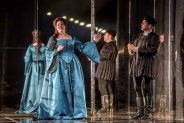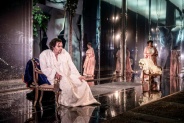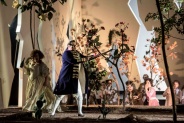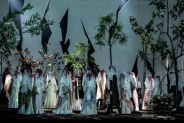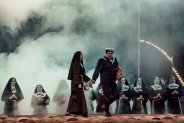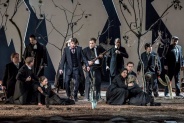Pamela Recinella interprets Verdi's opera Macbeth as the dilemma of modern man to legitimise thinking outside society's conventional moral order and the nihilistic consequences such practice inevitably leads to. In her view, Macbeth thinks as a modern man: both rational and revolutionary, he can no longer accept sovereignty and servitude. But we realise that with the murder of the king, Macbeth has at once killed God and morality. We might conceive of him as a tragic hero, for in his attempt to overthrow the ancient régime he becomes monarch who restores absolutism. We see in him any tyrant, any dictator from the past century, and most disconcertingly we still could see him as one of us. Driven by ambition, he can no longer trust his friends, as he has no control of himself. The childless Macbeth desires that the power attained through his murderous deeds will not be used to profit the children of others. Instead he wants to keep his power forever for himself and therefore annihilates the offspring of his rivals. Macbeth awakes not only the path to blind ambition of the unscrupulous man of today, when personal greed, exploitative interest and demand of self-autonomy destroy social cohesion and life, but leaves us with the bitter conclusion that the humanistic revolution failed to fulfil its utopian dream; we still proclaim its principles while continuing the breakup of humanity which it generates.
Press comments
Pamela Recinella siedelt das Stück "in sehr verschiedenen Zeiten, in der Shakespearezeit, im 18. Jahrhundert, im 19. und im 20 Jahrhunert an. Sie unternimmt in ihrer Inszenierung eine Zeitreise, um zu demonstrieren, dass das Shakespearsche Thema zeitlos ist und bis heute aktuell. Also das Thema Macht contra Moral.(...)Der verbrecherische Weg der Macht, die Brutalität des Machterhalts, und die Entartung von Moral zum menschenverachtenden Nihilismus die Regisseurin interessiert und das will sie exemplarisch aufzeigen, nicht historisch-werktreu, nicht realistisch, sondern als phantastisches Theater, als Traumspiel, als surreale visuelle Metapher.(...) Man hat sich das szenisch vorgestellt als Maschinentheater. Man könnte auch sagen Zaubertheater. Die lautlosen Hubpodien und Kulissenzüge des Erfurter Theaters sind unermüdlich im Einsatz, und erlauben es, blitzschnell und mühelos den phantastischen Spielraum zwischen zerborstenem, weißen Saal und Spiegelkabinett,Klassenzimmer mit Schulkindern in Matrosenanzügen und eher mediterranem als schottischem Sommernachtstraum- Wäldchen samt elfenhaften Hexen und weißbockigen Satyrfiguren, zwischen Schlachtfeld und Friedhof, überdimensioniertem Ehe-Wasserbett als symbolischer Seelen-Reinwaschanlage und königlichem Repräsentationszimmer hin- und herwechseln zu lassen.(...)ihre Inszenierung ist grell und kantig, aber sehr professionell und sie hat durchaus eine eigene Handschrift und einen eigenen Ausdruckswillen, der seine Faszination hat für den, der nicht am Konventionellen klebt.(...) Da kann man nur sagen: Hut ab! Eine tolle Aufführung, sehens- und hörenswert."
Pamela Recinella stages the opera across very different historical times – in the Shakespearean period, in the 18th century, in the 19th and finally in the 20th centuries – undertaking a journey through time in order to demonstrate how Shakespeare’s theme is timeless and continues to this day the topic of power versus morality (...) The criminal path to power, the brutality of maintaining it, and the degeneration of morality to inhuman nihilism interests the director, and she wants to provide an example, not historical, not realistic, but as a fantastic theatre, as a dream game, as a surreal visual metaphor. (...) This was imagined as a scenic machine theatre; you could also say magic theatre. The silent moving platforms and scenery equipment of the Erfurt opera house are tirelessly in action, and allow the stage to switch effortlessly between a broken, white hall and a hall of mirrors; between a school classroom and a grove of trees, more Mediterranean than Scottish Midsummer Night's Dream, with ivory witches and white-bearded satyr figures; between battlefield and cemetery; between an over-sized marriage bed – here a waterbed symbolic of washing the soul clean – and a royal reception room. Bright, edgy, and very professionally directed, Recinella has her own style and her own vision to express, which has its fascination for those who do not stick to the conventional (...) One can only say: “Hats off!” A great performance, worth seeing and hearing.
Rezension in MDR Figaro 25.04.2016. Von Dieter David Scholz
Gånsehaut- Momente- Premiere der Macbeth- Inszenierung von Pamela Recinella in Erfurt. Visuellen Genuss versprochen und geliefert.
Eigentlich hat Pamela Recinella mit ihrer Inszenierung von Giuseppe Verdis " Macbeth" alles richtig gemacht. Denn zum Berufsbild des regisseuurs gehoert, sprachliche, musikalische, musikalische und visuelle Mittel subjektiv zu interpretieren. Pamela recinella versprach visuellen Genuss und liefert selbigen. Doch anstatt "nur" zu erzåhlen, hielt sie dem Publikum, das deshalb fuer sie mit Beifall geizte, eine Vorlesung. Fraglos inszenierte Recinella mit breitem Wissen um Werk und Zusammenhånge literarischer, historischer und psychologischer Art und sah auch von den technischen Moeglichkeiten der Erfurter Theaters sowie von der Motivation seiner Mitarbeiter- Hartmut Schoerghofer (Buehnenbild) und Hank Kittel (Kostueme)-verfuehrt.
Goose-pimple moments - Premiere of Macbeth by Pamela Recinella in Erfurt. Visual enjoyment promised and delivered.
Pamela Recinella has done everything right with her production of Giuseppe Verdi's "Macbeth". For the job of the director lies in the subjective interpretation of linguistic, musical and visual means. Pamela Recinella promised visual enjoyment and delivers it. But not only this, she gave a lecture to the audience…. Unquestionably, Recinella staged a broad knowledge of literary, historical, and psychological works and connections, and also looked at the technical possibilities of the Erfurt theater and entrapped the motivation of her co-workers - Hartmut Schoerghofer (stage design) and Hank Kittel (costumes).
TA Kultur 26.4.16 von Ursula Mileke.




